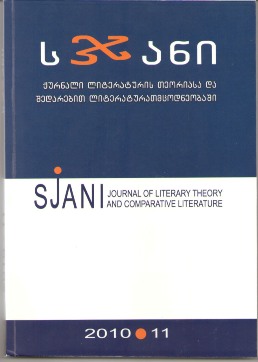რეალისტური/პოსტმოდერნული პროზის კომპოზიცია
Composition of Realistic vs. Postmodern Prose
Author(s): Gaga LomidzeSubject(s): Literary Texts
Published by: ლიტერატურის ინსტიტუტის გამომცემლობა
Keywords: literary theory; literary concepts; narratology; contingent possibilities
Summary/Abstract: A term composition can be defined as feature of composing a text that determines its content, character and purpose that at a certain extent facilitates to its reception process. To organize a literary text or to compose it is an essential organizing component of literary/artistic form and it gives a literary text its wholeness, at the same time subordinating every single element to each other and to the whole. Composition is a formal part of a literary text, but it often defines its content. It helps an author to fulfill his/her intentions. By outlining different point of views in literary texts, it is possible to describe a structure of literary text. A point of view implies an attitude of an author, according to which s/he tells us a story. Thus, it is possible for us to identify several viewpoints in a literary text: ideological, phraseological, psychological and temporal-and-spatial. The article deals with the viewpoints in literary texts identified in “A Poetics of Composition” by Boris Uspensky. In a history of literature methods of organizing a literary text are drawn out that combine it as a whole. Generally a literary text can have a prologue, an exposition always precedes a plot, a literary text is always ended by an epilogue, etc. These elements construct a frame of literary or artistic text in the frames of which key events develop without damage of unity of a literary text. A method of plot framing, when an author brings the narrator into a text that tells the stories confirming system of values presented in a literary work and/or introduces additional information to the reader, is usual. This kind of frame could involve several stories. Esthetical and ideological priorities of certain epoch or changes of cultural paradigms significantly define features of compositional construction. For instance, in 20-21st centuries a 19th century linear narrative (i.e. “On the Gallows” by Ilia Chavchavadze) has been substituted by non-linear narrative. It is worth to mention that 19th century tendency of omniscient author has been replaced by the activation of the reader’s attitude since the declaration of concept of the death of the author. The situation is visible enough while comparing the prose fiction by Ilia Chavchavadze and Aka Morchiladze. For descriptive reasons “On the Gallows” by Ilia Chavchavadze and “August’s Solitaire” are analyzed in the article according to viewpoint triad – author-text-reader. Thus, we try to reveal how the canons of composition had changed between 19th and 21st centuries as well as issues concerning reader’s reception. As a conclusion, we cite the words by Yuri Lotman where he differentiates a unity of might-have-been possibilities in real life and in literary texts. A literary text could be considered as the different kind of reality and to compose a literary or artistic work is similar to working on a fiction, when a writer faces the same might-have-been or contingent possibilities where he has to make a
Journal: სჯანი
- Issue Year: 2010
- Issue No: 11
- Page Range: 33-48
- Page Count: 16
- Language: Georgian

